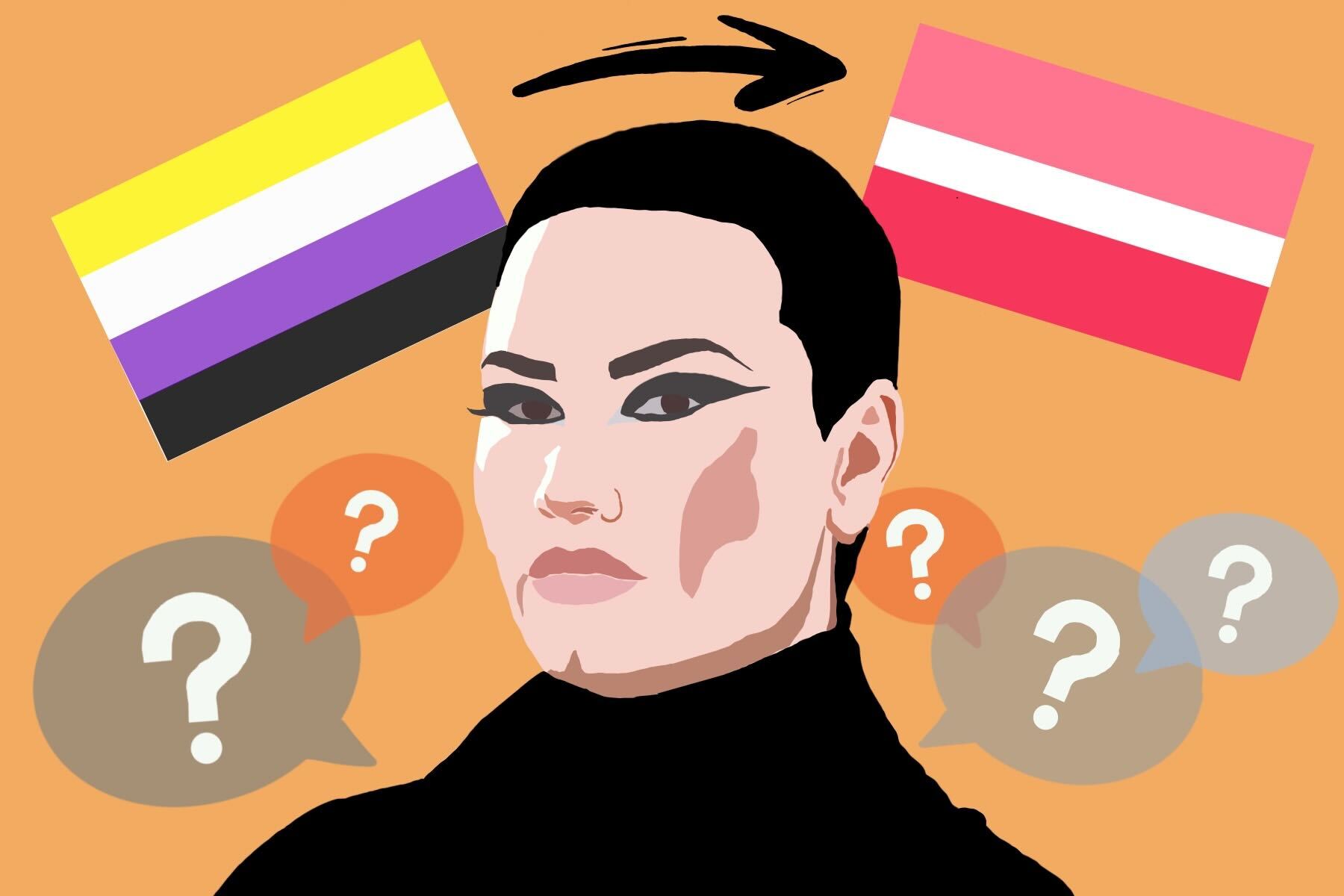Demi Lovato’s eighth studio album, “Holy Fvck,” marks a welcomed return to rock and a surprise change in pronouns.
In May 2021, Lovato came out as nonbinary, announcing publicly that they used they/them pronouns. A year later, on Aug. 2, Lovato confirmed on “Spout Podcast” they now use she/her pronouns in addition to they/them. After announcing their personal truth, they endured an onslaught of transphobic and dismissive comments.
This brutal response to Lovato’s truth reveals that the reception of a “coming out” has never been unconditional. The additional pronouns seemed difficult for other people to grasp. Strangers insisted that a person be 100% sure of their true identity before ever making a personal announcement — almost as if coming out is already a burden for those receiving the news, so why dare put them through it again? Many people view coming out as a thing that happens once, when, in reality, people are always struggling and learning new things about their identity and sometimes want to share that. Coming out isn’t some bad film that’s repeatedly forced upon family and friends. It’s someone’s personal truth and the most authentic declaration of self. It needs to be respected on every level.
People break up and reconnect every single day. People change their minds far too frequently to measure. In one lifetime, a person’s favorite color won’t remain the same. This kind of growth and change is rarely challenged, unless it undermines the cultural hegemony of the dominant society. Lovato’s expanded pronouns boldly challenge these hegemonical forces — however, they do not challenge their personal nonbinary identity. Her newly adopted pronouns could proactively normalize greater gender fluidity, but the overwhelming rejection is troubling.
For a society that prioritizes happiness, it’s a shame that the personal happiness of others cannot be universally supported. The only valid responses to Lovato’s expanded pronouns would be support, and just maybe a considerate question in the event of curiosity.
This debacle proves that coming out isn’t for those declaring their truth, but for the privileged society receiving the message. If coming out was truly for the individual, why must it be publicly declared to the world? Seemingly, “coming out” is meant to protect those who aren’t queer. How could someone dare to exist in an overwhelmingly white, cisgender and straight society if they didn’t announce how exactly they betray it? It’s as if LGBTQ+ people must declare their entire identity at the border in order to enter society as themselves — upon approval, of course. The reception to Lovato’s revised pronouns sets a precedent that the general public might only listen to your truth once.
This blatant ignorance denies LGBTQ+ people the opportunity to grow. Lovato said explicitly that this change wasn’t convenient or at all planned, but in fact came from self-reflection. “Recently, I’ve been feeling more feminine, and so I’ve adopted she/her again. But I think what’s important is, like, nobody’s perfect,” she said. Lovato’s decision to adopt pronouns she previously didn’t identify with doesn’t make her a criminal. Human beings should not have a limit to the number of times that they discover themselves. What should be applauded is that Lovato is bravely sharing their truth in the first place.
The responses not only dismissed Lovato’s pronouns, but the concept of personal identity entirely. Coming to terms with and accepting personal identity is a grave challenge for anyone, especially minorities not privileged enough to be immersed in a community and culture that receives consistent representation. For an LGBTQ+ individual, let alone a celebrity with a global audience, to declare their true identity to the world should always be supported.
Society applauds toddlers for their first words, regardless of any mispronunciations. Children are applauded for every feat because each one is just that — an attempted challenge. The task of personal identity should never be a race, but a journey down the river of life. Why must someone learn every crevice of their own identity on the first try? Attempts to describe personal identity use labels, and labels are not real. They’re merely descriptors and language that externalize internal thought. If labels aren’t real, why is any time wasted on policing and adjudicating which ones an individual uses for themselves? Truly, pronouns are some of the most harmless means of identification but the payoff is some of the most transformative. Using correct pronouns for humans isn’t just an act of respect but one of kindness. It’s a small demonstration of genuine recognition.
Though it is a kind gesture, it isn’t currency. Respecting the pronouns of another is the most basic level of human decency.
Coming out multiple times shouldn’t be slandered but commended. Lovato now knows herself even more, and is remarkably more in tune with her gender identity. They’re allowed to express her femininity in any way she pleases, and any amount of feminine expression is valid. A nonbinary individual exercising any level of masculinity or femininity does not betray their own identity, but merely reaffirms their own gender identity. Lovato’s announcement should be praised because they had the strength to share this new aspect of their identity. If she decides in the future to amend her pronouns, it should be followed by a wild amount of support. Individuals are never done growing, and the continual exploration of one’s identity is criminally low-regarded.
Lovato’s gender identity shouldn’t just be respected but praised for its inconceivable honesty too few can bear.
















